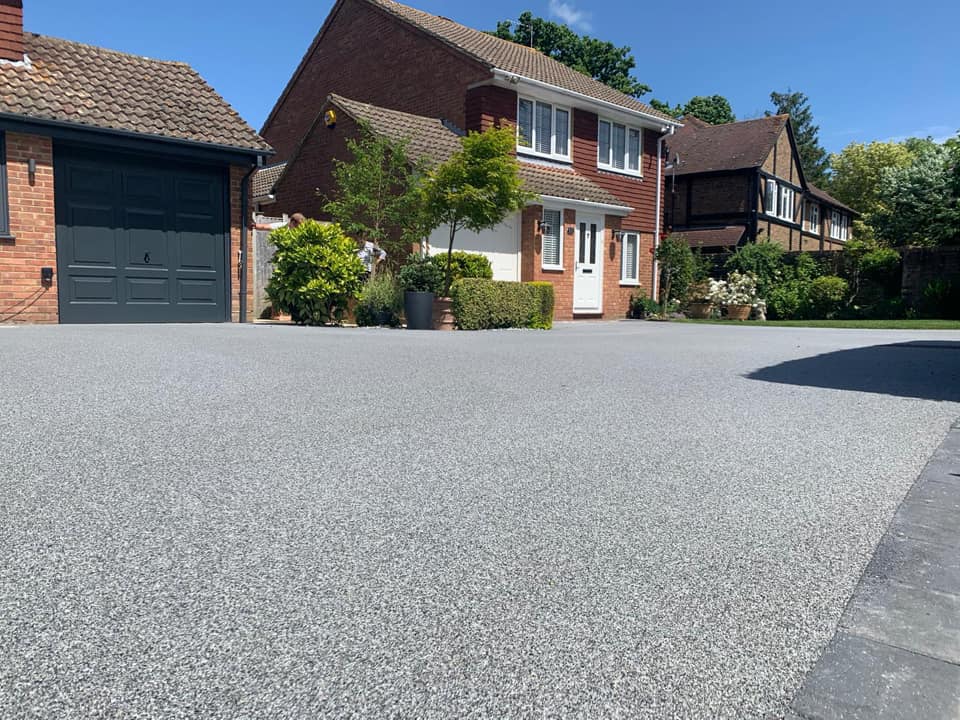Resin driveways are getting a lot of attention these days, and it’s not hard to see why. They look sleek, they’re low maintenance, and they claim to last for years. But how tough are they, really? If you’re considering one for your home, you’ll want to know if they can stand up to the test of time, heavy vehicles, and the unpredictable British weather.
Built to Last – But How Long?
A properly installed resin driveway can last anywhere from 15 to 25 years. That’s a pretty good lifespan, especially compared to traditional alternatives like concrete or tarmac. Of course, longevity depends on a few factors: the quality of the materials used, how well it’s installed, and how much traffic it gets.
Working with experienced resin driveway installers is essential to getting the full lifespan out of your surface, as the quality of installation plays a major role in long-term performance.
Resin driveways are made from a mix of aggregates (small stones) and resin, which binds everything together into a solid surface. This combination makes them both flexible and hard-wearing. Unlike concrete, which can crack under pressure, resin surfaces tend to absorb slight ground movements without breaking apart. That’s a big advantage, especially in areas where temperatures fluctuate.
Can It Handle the British Weather?
Anyone who lives in the UK knows that the weather isn’t exactly predictable. One day it’s sunny, the next it’s raining sideways, and in winter, there’s frost to contend with. The good news is that resin driveways are permeable, meaning rainwater drains through instead of pooling on the surface. This reduces the risk of puddles and ice forming, which can lead to damage over time.
That said, UV stability is an important factor. Some resins are UV-resistant, while others aren’t. If a non-UV-stable resin is used, the colour can fade or even turn yellow over time. For long-term durability, it’s worth opting for a UV-resistant resin, especially if your driveway gets a lot of direct sunlight.
Heavy Vehicles: No Problem?
If you’ve got a large car, a van, or even a motorhome, you might be wondering if a resin driveway can handle the weight. Generally speaking, yes – as long as it’s installed correctly. A resin-bound driveway needs a solid base, usually concrete or tarmac, to support heavy loads. If the base isn’t up to scratch, the surface can start to break down much sooner than expected.
Frequent heavy traffic can cause wear over time, especially in areas where vehicles turn frequently, like near garage entrances. In these high-use spots, some minor surface deterioration may appear over the years, but nothing drastic if the driveway has been installed properly.
Maintenance: Easy, But Necessary
Resin driveways are low maintenance, but that doesn’t mean you can just forget about them completely. Regular cleaning helps keep them looking fresh and extends their lifespan. A simple sweep and the occasional pressure wash will do the trick.
Weeds don’t tend to be a problem because the surface doesn’t allow them to take root. However, if debris is left for too long, moss and algae can start to grow, making the surface slippery. It’s a good idea to give it a clean every few months to prevent this from happening.
Oil stains from cars are another thing to watch out for. While resin driveways are resistant to most stains, it’s best to clean up spills quickly before they have a chance to sink in.
Common Issues and How to Avoid Them
Even though resin driveways are durable, they’re not completely indestructible. Here are a few common problems that can arise:
-
Loose Stones – If the resin isn’t mixed properly or applied too thinly, the stones can start to come loose. Choosing an experienced installer helps prevent this.
-
Cracking – This is rare, but if the base underneath isn’t solid, movement in the ground can cause cracks to appear.
- Discolouration – As mentioned earlier, non-UV-stable resin can fade over time. Choosing a high-quality resin prevents this issue.
- Wear and Tear in High-Traffic Areas – Over time, spots where cars regularly turn or brake may show slight wear. In extreme cases, resurfacing may be needed after several years.
Comparing to Other Driveway Types
If you’re weighing up your options, it’s helpful to compare resin driveways to other common choices:
-
Concrete: Strong and long-lasting, but prone to cracking over time, especially in areas with frequent freezing and thawing. While stamped or coloured concrete can improve its appearance, it generally lacks the sleek look of resin.
-
Tarmac: A practical and cost-effective option, particularly for larger driveways. However, it can soften in extreme heat, leading to surface damage, and doesn’t offer the same modern, decorative finish that resin provides.
-
Block Paving: A visually appealing choice with a variety of patterns and colours. However, it requires regular maintenance to prevent weed growth and to keep the blocks from shifting or sinking over time. Pressure washing is often needed to maintain its look.
-
Gravel: Affordable and permeable, making it a good option for drainage. However, loose stones can scatter, creating an uneven surface that requires regular raking and topping up. It’s also less convenient for pushing wheelchairs or prams over.
Is It Worth It?
If you’re looking for a driveway that lasts, looks good, and doesn’t require too much upkeep, resin is definitely worth considering. It stands up well to daily use, the weather, and heavy vehicles provided it’s installed properly. Choosing a reputable installer and investing in high-quality materials makes all the difference.
